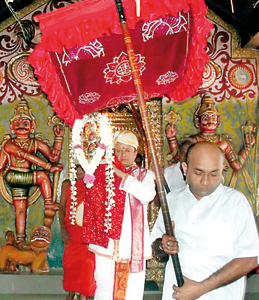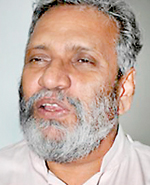Why can’t women vote at elections of Nilames?
Hot on the trail of MP Wijedasa Rajapakse’s bid to introduce legislation to bar the Sangha from engaging in politics as an amendment to the Vihara and Devalagam Act (Buddhist Temporalities Act,) the chief Sangha in a special statement has requested the Prime Minister and Minister of Buddha Sasana D.M. Jayaratne to bring amendments to the Buddhist Temporalities Act to Parliament without further delay. The Act was passed in 1931 by the then British legislators and MP Rajapakse’s focus in bringing a Private Member’s Bill to Parliament is restricted only to the exclusion of the Buddhist clergy from legislative bodies.
However, a glaring lapse in this archaic Act, has escaped the attention of legislators and others concerned since it was introduced over 80 years ago. At a time when women’s rights are being extensively discussed, the fact that this Act has constitutionally barred women from voting in the election of the Diyawadana Nilame – the custodian of the Temple of the Tooth Relic and the Basnayake Nilames of the more important Devales, has not caught the attention of our legislators. The two categories mentioned in the Act out of the officials not eligible to vote at these elections are the non-Buddhist officials and female officials. As there were no female officials in the Public Administration at the time the Act was passed in 1931 by the all-male legislature, why the Act had to mention at all of the fact that women were not eligible to vote, is a matter of curiosity.
In the election of the Diyawadana Nilame, an election held every ten years, about 300 are eligible to vote. This includes Basnayaka Nilames of the 13 Devalas, the Chief Priests and the lay custodians of the Temples administered by clause 4.1 of the Act along with the government officials. The government officials include 20 Divisional Secretaries and the District Secretary of the Kandy District Secretariat. Six of the Divisional Secretaries are women which means quite a percentage of votes are being denied from voting!
This archaic Act was amended in 1993 when a clause was introduced to prohibit Members of Parliament from contesting for the Diyawadana Nilame posts. This had been done with the intention of keeping out a certain politician from contesting the post of Diyawadana Nilame. Although women were serving in the Sri Lanka Administrative Service (SLAS) at the time the amendment was made neither the policy-makers nor the SLAS corrected this discrepancy.
Almost the same group eligible to vote in the election of the Diyawadana Nilame are listed as those having the right to vote in the election of the 13 Basnayaka Nilames which takes place every 5 years. The officials who have voting rights in the case of the Basnayake Nilames however, have to be those serving within the zones as specified in the Act for each Devale. For example, at the election of a Basnayake Nilame if his Devale is specified under the Kandy District, only the District and the Divisional Secretaries of the Kandy District are eligible to vote along with the rest listed in the Act.
In the case of the election of Basnayake Nilames of Devales of Districts outside Kandy, the Act has specified Divisional Secretaries in other District Secretariats as eligible to vote, in which case, more women Divisional Secretaries serving in these zones, have been barred from voting.
Are Divisional Secretaries involved with work of the Nilames? According to the Kandy District Secretariat, there is plenty of work involved especially with regard to land issues that belong to the Temple of the Tooth Relic and the Devalas which the Divisional Secretaries have to handle. These issues relate to lands that have been gifted by the Kings and have proved to be complicated which need to be dealt with the relevant custodians.
According to the Kandy District Secretariat, there had hardly been complaints made by custodians of mishandling of work by women Divisional Secretaries.
The Divisional Secretaries are appointed by the Sri Lanka Administrative Service (SLAS.) To qualify to enter the SLAS, one has to sit one of the most competitive examinations open to candidates who possess a degree from a recognised University and the few who clear this hurdle are appointed as Divisional Secretaries irrespective whether they are men or women.
Each Divisional Secretary who functions under the District Secretariat, is given in charge of the overall administration of the Divisional Secretariat. No consideration is made on the basis of gender when appointments are made, of the political climate that exists or the remoteness of the Division. According to the SLAS, no records exist of women Divisional Secretaries dropping out on the condition of toughness and demands of the job. On the contrary, they have been working as hard as their male counterparts.
It is these officials who after their stint as Divisional Secretaries are selected for higher positions in Ministries, Commissions etc. and end up playing a role in assisting the relevant authorities to formulate policies for the country.
The election of the Diyawadana Nilame is coming up in 2015. Therefore, let us hope the attention of the legislators will be drawn when amendments are made to the Act and steps taken to remove such discrepancies at a time when the status of women has become a fashionable topic.
comments powered by Disqus





















